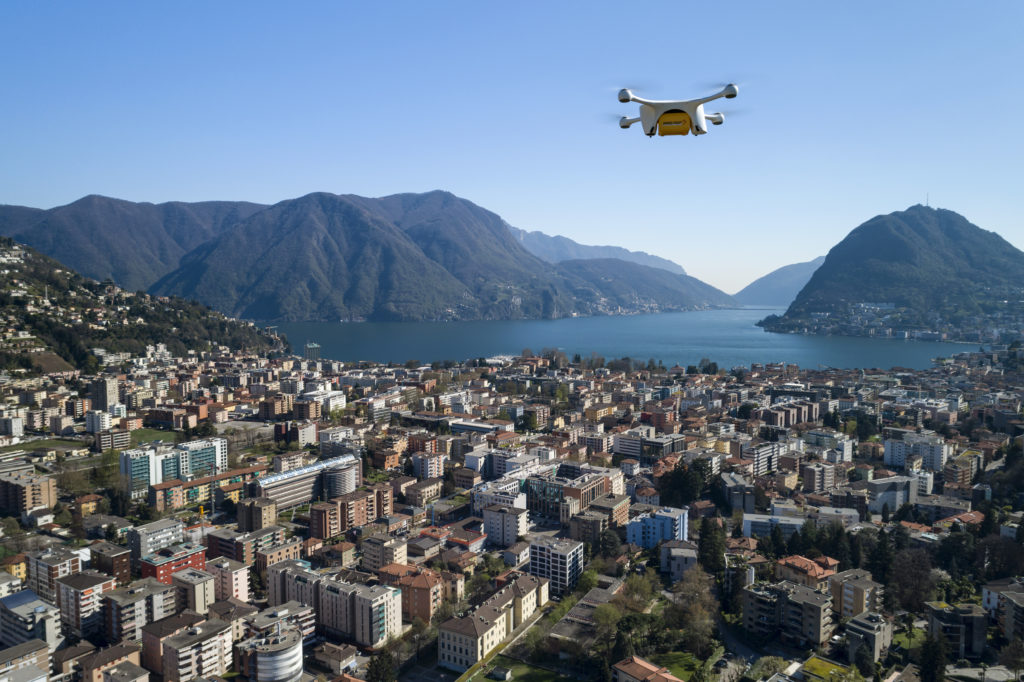
using autonomous drones
to deliver urgent medical
goods since October 2017
In early 2015 discussions between Swiss Post and various hospitals, blood-testing laboratories and doctors in Switzerland showed the inefficiency of the logistics processes used within the medical and pharmaceutical sector. Swiss hospitals transport urgent medical goods using expensive in house couriers, taxis or even ambulances. This results in high costs, significant time losses, and considerable coordination efforts.
Swiss Post set out to solve some of these challenges by looking at how medical goods can be transported faster and more cost-efficiently. As a result, since October 2017 the post has been using autonomous transportation drones, which fly at around 72km/h (45mph), to carry urgently required medical goods quickly, cost-effectively and flexibly from A to B, leading to savings of up to 80% in transportation time and costs.
“The autonomous drones have been commercially operating in Lugano, a city in southern Switzerland, since October 2017, and transporting blood samples between two hospitals,” says Andrea Marrazzo, head of autonomous delivery, Swiss Post. As a result, the hospitals have reduced the previous transportation time of 30-45 minutes by taxi to just three to four minutes by drone. This shortens the patient’s treatment time while enhancing treatment quality. Swiss Post, meanwhile, has the opportunity to offer a new transportation service in the healthcare market, which will allow it to expand its position in the field of logistics outsourcing.
Technology and regulations
Swiss Post entered into a long-term technological partnership with drone manufacturer Matternet with the goal of establishing transportation drones as a means of conveyance. “The drones are faster, independent of traffic volume and more ecological,” adds Janick Mischler, project manager, development and innovation, Swiss Post. “They are on-demand and available whenever they are needed, so the availability is much better than with traditional couriers or taxis.”
To make this project a reality, a number of regulations had to be considered, as Marrazzo explains: “The Federal Office of Civil Aviation in Switzerland defines the regulatory conditions that have to be fulfilled to receive an approval for beyond visual line of sight operations. In the application, you have to prove that your vehicle is as safe as possible. For example, our Matternet drone has redundant controlling systems and a parachute that is automatically deployed in the unexpected event of a total system failure. The application process is very demanding and it takes months or even years to reach the requested level of maturity.”
Aside from meeting the different regulatory conditions, Swiss Post also gained a lot of support from stakeholders keen to make sure the project was a success. “We received great support from many different stakeholders,” says Mischler. “Our management directors have always supported our plans and helped to push this project forward to the authorities. The authorities have also been very supportive and open minded. They have worked hard to enable rather than prevent autonomous drone operations.”
Marrazzo continues, “The greatest thank you goes to the hospital group of Lugano, especially its CEO Luca Jelmoni, who is a pioneer. The hospital is actually the first company worldwide that has been using delivery drones in an urban area for its logistics.”
As a result of the success of the medical goods autonomous transportation project, Swiss Post has received a lot of interest in drone logistics from the healthcare sector.
Future plans
“We are in contact with many prospective customers all over Switzerland, including hospitals, blood labs and medical facilities,” says Marrazzo. “They have requested our drone delivery solution to improve their logistics. We have begun expansion of the solution by conducting test operations in the cities of Berne and Zurich in June 2018. All partners involved have already expressed interest in further cooperation.”
Swiss Post is currently focusing on medical applications for drone delivery, but it is considering new drone services in other areas. Mischler explains, “There are no concrete plans at the moment, so we can’t be certain which industry could be served next. Drones are primarily suitable for transporting special deliveries. They will complement, but not replace, traditional parcel delivery.”
Marrazzo concludes, “This award shows the rising relevance and importance of drones as a method of delivery. We remember people’s perception of drones when we started the first trials in summer 2015, when everyone thought drones were a toy and our team at Swiss Post was playing around. The recent progress and especially this award prove that the perception has changed dramatically in the last three years.”
Watch this video to learn more:
Also shortlisted:
- Same-day time slot delivery, On the dot
- Ground-based delivery robot, Posten Norge and Buddy Mobility
- Mapping software, Locpin
- Postal Robotics, Image Architects and ZCS International
- Drone Pay by Worldpay


